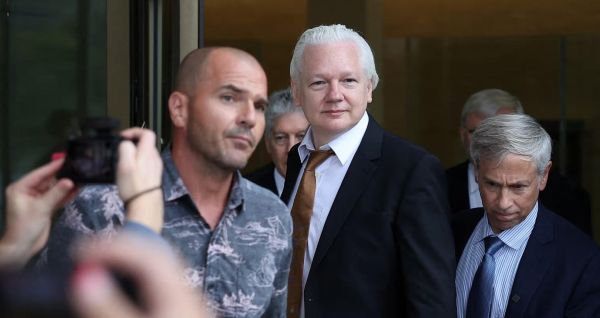
Julian Assange a free man after pleading guilty to disclosing classified national defense information

Julian P. Assange, 52, the founder of WikiLeaks, pleaded guilty on Tuesday to conspiring with Chelsea Manning, at that time a U.S. Army intelligence analyst, to unlawfully obtain and disclose classified documents relating to the U.S. national defense. After obtaining that classified national defense information from Manning, and reportedly aware of the harm that dissemination of such national defense information would cause, Assange disclosed this information on WikiLeaks.
The guilty plea concludes a criminal matter that dates back to March 2018, when Assange was first indicted in the Eastern District of Virginia. There, Assange was charged with conspiring with Manning, then a “Top Secret” U.S. security clearance holder, to further Manning’s unlawful acquisition and transmission of bulk classified information, including Manning’s use of a government computer to illegally download hundreds of thousands of classified documents and transmit them without authorization to WikiLeaks.
Assange was detained in the United Kingdom based on the U.S. charges for the last 62 months, while he contested extradition. As part of the plea agreement, Assange was transported to the U.S. District Court for the Northern Mariana Islands to enter his felony guilty plea for his June 26 (Saipan local time) sentencing in a U.S. courtroom, with the venue reflecting Assange’s opposition to traveling to the continental United States to enter his guilty plea and the proximity of this federal U.S. District Court to Assange’s country of citizenship, Australia, to which he will return.
At the June 25 proceeding, Assange admitted to his role in the conspiracy to violate the Espionage Act and received a court-imposed 62-month time-served sentence, reflecting the time he served in U.K. prison as a result of the U.S. charges. Following the imposition of sentence, he will depart the United States for his native Australia. Pursuant to the plea agreement, Assange is prohibited from returning to the United States without permission.
Beginning in late 2009, Assange and WikiLeaks actively solicited United States classified information, including by publishing a list of “Most Wanted Leaks” that sought, among other things, bulk classified documents. As set forth in the public charging documents, Assange actively solicited and recruited people who had access, authorized or otherwise, to classified information and were willing to provide that information to him and WikiLeaks—and also solicited hackers who could obtain unauthorized access to classified information through computer network intrusions. Assange publicly encouraged his prospective recruits to obtain the information he desired by any means necessary, including hacking and theft, and to send that information to Assange at WikiLeaks.
Between January 2010 and May 2010, in the course of the conspiracy with Assange, Manning used U.S. government computer systems to download hundreds of thousands of documents and reports, many of them classified at the SECRET level and relating to the national defense, which signified that unauthorized disclosure could cause serious damage to United States national security. In total, Manning downloaded four nearly complete U.S. government databases that contained, among other things, approximately 90,000 Afghanistan war-related significant activity reports, 400,000 Iraq war-related significant activity reports, 800 Joint Task Force Guantanamo (JTF GTMO) detainee assessment briefs, and 250,000 U.S. Department of State cables. Manning also downloaded files regarding rules of engagement in the Iraq war, most of which were classified at the SECRET level and which delineated the circumstances and limitations under which United States forces would initiate or conduct combat engagement with other forces.
After downloading digital reams of classified documents and files, Manning electronically sent them to Assange to be publicly posted on WikiLeaks’s website. During Manning’s bulk exfiltration and passage of classified materials to WikiLeaks, Manning and Assange communicated regularly via online platforms about Manning’s progress and what classified information Assange wanted. For example, after sending the classified JTF GTMO detainee assessment briefs to Assange, Manning told Assange “thats [sic] all I really have got left.” To encourage Manning to continue to take classified documents from the United States and provide them to Assange and WikiLeaks without authorization, Assange replied, “curious eyes never run dry in my experience.”
In or about 2010 and 2011, Assange publicly disclosed via the WikiLeaks website hundreds of thousands of documents that Manning had taken without authorization and given to him, including:
- approximately 75,000 Afghanistan war-related significant activity reports, classified up to the Secret level;
- 400,000 Iraq war-related significant activity reports, classified up to the Secret level;
- 800 JTF GTMO detainee assessment briefs, classified up to the Secret level; and
- over 100,000 State Department cables, some of which were classified up to the Secret level.
Unlike news organizations that published redacted versions of some of the classified documents that Assange obtained from Manning and then shared with those organizations, Assange and WikiLeaks disclosed many of the raw classified documents without removing any personally identifying information. Specifically, in many instances, the classified documents Manning unlawfully provided to Assange were later released publicly by Assange and WikiLeaks in a raw or unredacted form that placed individuals who had assisted the U.S. government at great personal risk.
Assange’s decision to reveal the names of human sources illegally shared with him by Manning created a grave and imminent risk to human life. For example, the State Department cables that WikiLeaks disseminated included information from journalists, religious leaders, human rights advocates, and political dissidents who had chosen to provide information to the United States in confidence at significant risk to their own safety.
Yesterday, The Washington Post reported that Barry Pollack, the attorney for Julian Assange, emerged from the courthouse and characterized his client as a whistleblower of U.S. misconduct who does not agree that he did anything wrong.
“The prosecution of Julian Assange is unprecedented. In the hundred years of the espionage act, it has never been used by the United States to pursue a publisher, a journalist, like Mr. Assange,” Pollack said, speaking at a brief news conference outside the U.S. District Court for the Northern Mariana Islands early Wednesday afternoon. “Mr. Assange revealed truthful, important and newsworthy information, including revealing that the United States had committed war crimes.”
He added: “We firmly believe that Mr. Assange never should have been charged under the Espionage Act, and engaged in exercise that journalists engage in every day.
###
(Source: FBI)
(Cover photo: Julian Assange leaves Saipan Federal Court a free man, Image credit: Twitter)
Posted by Richard Webster, Ace News Today
Follow Richard on Facebook, Twitter & Instagram






